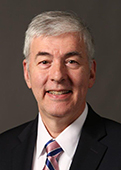sshadmin posted on August 03, 2018 09:48
 Hello fellow simulation colleagues. I recently returned from the Society’s SimOps conference in Portland Oregon, USA. I was impressed. The Pacific Northwest of the United States was a stunningly beautiful backdrop for this conference. The planning committee and SSH staff put together a wonderful professional development program for simulationists that attracted almost 300 attendees from all over the USA and 7 different countries. Many thanks to our hosts, Oregon Health Sciences University and the planning team of Ryne Ackard, Melissa Lowther, Sean Cavanaugh and Christina Tenorio for their wonderful program, hospitality and facilities.
Hello fellow simulation colleagues. I recently returned from the Society’s SimOps conference in Portland Oregon, USA. I was impressed. The Pacific Northwest of the United States was a stunningly beautiful backdrop for this conference. The planning committee and SSH staff put together a wonderful professional development program for simulationists that attracted almost 300 attendees from all over the USA and 7 different countries. Many thanks to our hosts, Oregon Health Sciences University and the planning team of Ryne Ackard, Melissa Lowther, Sean Cavanaugh and Christina Tenorio for their wonderful program, hospitality and facilities.
The conference featured many topics in Operations, Technology, Administration, Leadership and Professional Development. There was a “simventors” session where many new products developed by operations specialists in their own centers were on display for all to see and share. The Plenary session by Mark Sonoda from NASA focused on the impact of professional development on instructors while the closing plenary by Scott Atkinson, Maeve Geary and SSH Board member Jamie Stiner focused on inventing your career success.
During the program, I met a number of highly motivated and talented simulation operations specialists doing the daily work of delivering high-quality simulations in all modalities. The healthcare simulation dictionary defines an operations specialist as “an individual whose primary role is the implementation and delivery of a simulation activity through the application of simulation technologies”. They are a vital part of the simulation delivery team in small, medium and large programs. They come from diverse backgrounds and capabilities and are true professionals who recognize that simulation is a successful career path with lots of growth potential.
In the sessions and panels, I came to recognize just how wide the opportunities for operations specialists can be. They are much more than technicians. They plan operations, fix equipment, run complex AV systems, consult with subject matter experts in scenario design, create new simulators, lead and supervise personnel and advocate for simulation in their programs. This means that if you are currently an operations specialist, you have a variety of paths from which to advance and develop yourself beyond your initial ability to operate the simulator. Take advantage of what our Society has to offer in terms of mentorship, networking resources, webinars, certification as a CHSOS and our face to face meetings. In our Society, operations specialists chair committees and sections, sit on our board of directors and provide vital leadership and mentorship to our many members. They are the key to the success of many simulation programs worldwide. We should and must celebrate these professionals for what they do. One way to do this is to engage this community in Healthcare Simulation Week this September to be ambassadors for high quality simulation.
I salute the women and men of the operations specialist community and I appreciate your dedication to improving healthcare simulation to benefit patient care.
-
Joe Lopreiato, MD, MPH, CHSE, CHSE-A
Bethesda, MD